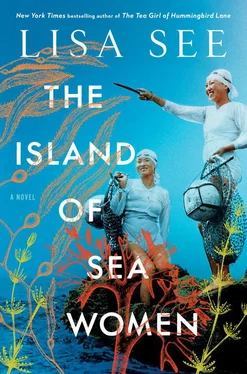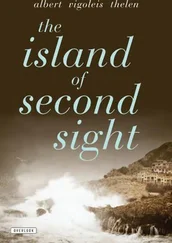We still had another two and a half months to go before she returned to Seoul.
“Tell me about the book,” I said, trying to find a way to connect. “Remember when you read Heidi to me. Maybe you could read this one—”
She looked at me with annoyance that turned to sadness. “Mother, you wouldn’t understand it. I’m trying to read ahead for the sociology class I’m taking next semester.”
Sociology. It wasn’t the first time I didn’t know what she was talking about.
“All right,” I said, turning away. “I’m sorry. I won’t bother you again.”
“Oh, Mother, don’t take it that way.” She put the book down, crossed the room, and put her arms around me. “I’m the one who should be sorry.”
She stared into my face, and I was taken aback, as I always was, by how much her delicate features reminded me of her father. I smoothed tendrils of hair behind her ears.
“You’re a good girl,” I said. “And you make me proud. Go back to your studying.”
But inside, I hurt. I thought of her like seafoam—drifting farther and farther from me—and I couldn’t figure out how to change its course.
_____
Gu-ja, of all people, told me what sociology was. “It’s the study of how people get along. Gu-sun and I have a second cousin who does that work in Jeju City.”
That the Kang sisters had an educated relative in the city surprised me, but this also told me that I needed to adapt better to the changing conditions around me as I did, without thinking, to those in the sea.
“Do you mean how friends or family get along?” I asked.
“I suppose,” she answered, “but I think it’s more like what happens in our bulteok.”
For days I mulled over what Gu-ja had told me. Gradually an idea began to form in my mind. When the second diving period of summer arrived, I invited Joon-lee to come to the bulteok with her grandmother and me. “Not to go in the sea,” I explained, “but to learn about haenyeo society.” I was thrilled when she said yes.
Once in the bulteok, Joon-lee sat quietly, listening to the other divers and me as we changed clothes. “Is there food on this beach?” I asked the collective. As the typical boasting answers flew at me—“More food than rocks in my fields, if I had any fields” and “More food than the liters of gasoline it would take to fill my car, if I had a car”—she jotted them down in a notebook. When Do-saeng and her friends went to the beach to collect the algae that had washed ashore, Joon-lee joined me and the other haenyeo on the back of the truck to the dock. She hadn’t tied up her hair, and it blew here, there, and everywhere. Even as she waited on the boat while we dove, she didn’t properly cover her hair. Hours later, during our return to shore, she asked questions about what we were doing, but they only made me look like a bad mother.
“Haven’t you taught her anything about diving?” Gu-ja asked me.
When I let the years scroll across my mind, I could see I’d tried, but it hadn’t taken. As a young girl, Joon-lee had never been interested in taking the tewak I’d given her into the sea. She’d never borrowed my big eyes, nor had she asked me to make her a set of water clothes. When she turned fifteen, she was already living in Jeju City, so I couldn’t train her for sea work as my mother had trained me. I couldn’t help but be embarrassed in front of the collective, but my daughter came to my defense.
“Don’t tease your chief,” she said lightly. “She’s worked hard to give me this life. You’ve done the same for you daughters too, right?”
They had, but of course none of those girls had done as well as Joon-lee.
Once in the bulteok, we did as we usually did: warmed ourselves by the fire, cooked a meal, and talked about problems in our families. Joon-lee blossomed in front of me, asking all sorts of questions about our matrifocal society. This was the first time any of us had heard this label—a culture focused on women—and it intrigued us.
“You make the decisions in your households,” she explained. “You make money. You have a good life—”
Gu-ja waved off the idea. “We think of ourselves as being independent and strong, but all you have to do is listen to our songs to know our days are hard. We sing about the difficulties of living under a mother-in-law, the sadness of being separated from our children, and lament how difficult this existence is.”
“My sister’s right,” Gu-sun said. “ It’s better to be born a cow than a woman. No matter how stupid or lazy a man is, he has the better hand. He doesn’t have to supervise the family. He doesn’t have to wash clothes, manage the household, look after the elders, or see that the children have food to eat and mats to sleep on. He doesn’t have to do hard physical work in the wet or dry fields. His only responsibilities are to take care of babies and do a little cooking.”
“In other places, he would be called a wife,” Joon-lee said.
This made us laugh.
“So if you were a man,” she prompted, “how would your life be different?”
From my youngest days as a baby-diver, conversation in the bulteok had often centered on men, husbands, and sons. I could remember my mother leading a group as they discussed whether it was better to live as a man or a woman, but my daughter’s question sent the haenyeo in my collective in new directions.
Gu-ja answered first. “If I were a man, I wouldn’t worry about chores or responsibilities. I’d sit under the village tree, like they do, and contemplate big thoughts.”
“I’ve wondered sometimes if it would be better to be my husband,” Gu-sun admitted. “Ever since our daughter died, he drinks too much. I’ve asked him to find a little wife and share her home. His response? ‘Why should I do that when you already house and feed me?’ ”
I knew each woman’s story. Whose husband drank too much. Or gambled. Or beat her. Whenever a woman came to the bulteok with bruises, I told her the same thing I’d once told Mi-ja. Leave him! But they rarely did. They were always too afraid for their children, and maybe afraid for themselves.
“Drinking and gambling are the hardest,” one of the women commented. “Once my babies were old enough to be taken care of by their older siblings, my husband became purposeless. I felt sorry for him, but what would have happened if I’d started drinking and gambling?”
“I was a slave in my first husband’s family,” Yang-jin confessed. “My husband and father-in-law beat me. It’s true! I wouldn’t want to be a man who did something like that. I’m happier as a woman.”
“Someone will always take care of a man,” a woman said. “Ask yourself if you know a man who lives alone.”
No one could think of even one man in Hado who lived alone. He resided with his mother, his wife, his little wife, or his children.
Do-saeng finally joined the conversation. “Not many men can do without a wife, while all women can do without a husband.”
My daughter looked up from her notebook. “It seems to me that what you’re saying is you’re in charge, and yet you aren’t. When husbands die, houses and fields pass to sons. Why is it that men own all the property?”
“You know the reason,” I answered. “A daughter cannot perform the ancestral rites, so all property must go to sons. It is how we thank them for caring for us in the Afterworld.”
“It’s not fair,” Joon-lee said.
“It’s not,” I agreed. “Many of us lost sons in the war or during”—I lowered my voice—“the incident, which is why some here have adopted sons. But there are others of us, like myself, who’ve bought fields to give to our daughters one day.”
Читать дальше












